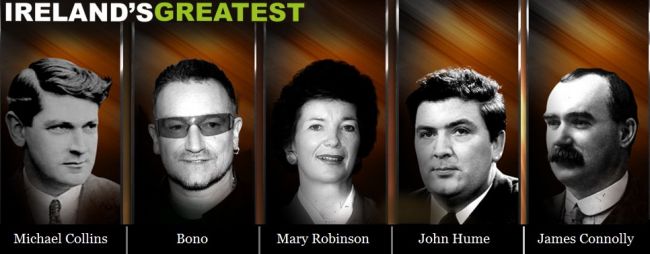| Irish Forums Message Discussion :: Ireland's Greatest final five RTE Vote |
   | Irish Forums :: The Irish Message
Forums About Ireland and the Irish Community, For the Irish home and Abroad. Forums include- Irish Music, Irish History, The Irish Diaspora, Irish Culture, Irish Sports, Astrology, Mystic, Irish Ancestry, Genealogy, Irish Travel, Irish Reunited and Craic
|  
|
Ireland's Greatest final five RTE Vote


|
|
|
| Irish
Author |
Ireland's Greatest final five RTE Vote Sceala Irish Craic Forum Irish Message |
kerrin

Sceala Clann T.D.
Location: Wicklow
|
| Sceala Irish Craic Forum Discussion:
Ireland's Greatest final five RTE Vote
|
|
|
The final five in a collective up for the title ....Ireland's Greatest, are a most odd bunch of Irish people.
Ireland's Greatest
Series looking for the greatest individuals in Irish history.
About the show Ireland's greatest
At the end of 2009 Ipsos/ MRBI, the independent market research agency, conducted a survey amongst a nationally representative sample of Irish respondents aged 15+.
Quotas were set by gender, age, social class and region to ensure a representative sample of the population was achieved. Eligibility was based on Irish Citizenship rules and in the interests of balance & fairness, serving politicians and RTÉ personalities were excluded from the survey.
On Monday March 22nd the top 40 names from this survey were put up on the RTÉ website (in alphabetical order), and people were then given the chance to vote for their greatest Irish person from that Top 40.
Two weeks later, the web vote closed and the Top Ten was announced. They were (in alphabetical order): Bono, Dr. Noel Browne, Michael Collins, James Connolly, Stephen Gately, John Hume, Phil Lynott, Padraig Pearse, Mary Robinson and Adi Roche.
Now, after thousands of public votes on the RTE Website, the search for Ireland's Greatest has been narrowed down to the final five: Bono, Michael Collins, James Connolly, John Hume and Mary Robinson.
Michael McDowell follows in the footsteps of Michael Collins, who played a vital role in the struggle for independence
Michael Collins
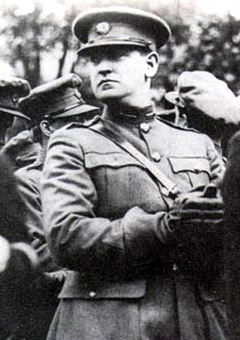
Michael "Mick" Collins (Irish: Micheal O' Coileain, 16 October 1890 – 22 August 1922) was an Irish revolutionary leader, Minister for Finance and MP for Cork South in the First Dail of 1919, Director of Intelligence for the Old IRA, and member of the Irish delegation during the Anglo-Irish Treaty negotiations.
After leaving school aged 15, Collins followed in the footsteps of many people from Ireland, especially of the Clonakilty area, and moved to London. While there he lived with his elder sister, and studied at King's College London. After taking the British Civil Service examination in February 1906, he was employed by the Royal Mail from July 1906. In 1910, he moved to London where he became a messenger at a London firm, Horne and Company. In 1915, he moved to the Guaranty Trust Company of New York where he remained until his return to Ireland the following year.
He joined the London GAA and, through this, the Irish Republican Brotherhood, a secret, oath-bound society dedicated to achieving Irish independence. Sam Maguire, a Church of Ireland republican from Dunmanway, County Cork, introduced the 19-year-old Collins into the IRB
Subsequently, he was both Chairman of the Provisional Government and Commander-in-chief of the National Army.
Throughout this time, at least as of 1919, he was also President of the Irish Republican Brotherhood. Collins was shot and killed in August 1922, during the Irish Civil War.
Although most Irish political parties recognise his contribution to the foundation of the modern Irish state, supporters of Fine Gael hold his memory in particular esteem, regarding him as their movement's founding father, through his link to their precursor Cumann na nGaedhael.
Bono
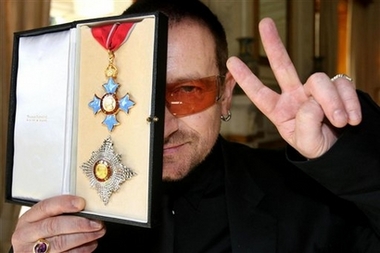
Bono
Birth name Paul David Hewson
Also known as Bono
Born 10 May 1960 (1960-05-10) (age 50)
Origin Glasnevin, County Dublin, Ireland
Genres Rock, post-punk, alternative rock
Occupations Musician, singer-songwriter, activist, philanthropist
Instruments Vocals, guitar, harmonica
Years active 1975–present
Associated acts U2
Paul David Hewson (born 10 May 1960), most commonly known by his stage name Bono, is an Irish singer and musician, best known for being the main vocalist of the Dublin-based rock band U2. Bono was born and raised in Dublin, Ireland, and attended Mount Temple Comprehensive School where he met his future wife, Ali Hewson, and the future members of U2. Bono writes almost all U2 lyrics, often using political, social, and religious themes. During their early years, Bono's lyrics contributed to U2's rebellious and spiritual tone. As the band matured, his lyrics became inspired more by personal experiences shared with members of U2.
Outside the band, he has collaborated and recorded with numerous artists, sits on the board of Elevation Partners, and has refurbished and owns The Clarence Hotel in Dublin with The Edge. Bono is also widely known for his activism concerning Africa, for which he co-founded DATA, EDUN, the ONE Campaign and Product Red. He has organised and played in several benefit concerts and has met with influential politicians. Bono has been praised and criticised for his activism and involvement with U2. He has been nominated for the Nobel Peace Prize, was granted an honorary knighthood by Queen Elizabeth II of the United Kingdom, and was named as a Person of the Year by Time, among other awards and nominations.
Mary Robinson
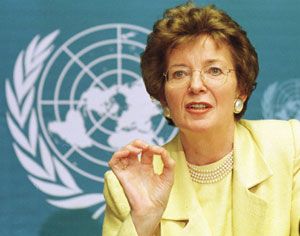
Mary Therese Winifred Robinson (née Bourke) (Irish: Máire Mhic Róibín,[2] born 21 May 1944) served as the seventh, and first female, President of Ireland, serving from 1990 to 1997, and the United Nations High Commissioner for Human Rights, from 1997 to 2002. She first rose to prominence as an academic, barrister, campaigner and member of the Irish Senate (1969–1989). She defeated Fianna Fáil's Brian Lenihan and Fine Gael's Austin Currie in the 1990 presidential election becoming, as an Independent candidate nominated by the Labour Party, the Workers' Party and independent senators, the first elected president in the office's history not to have had the support of Fianna Fáil.
She is credited by many as having revitalised and liberalised a previously conservative political office. She resigned the presidency four months ahead of the end of her term of office to take up her post in the United Nations. Robinson has been Honorary President of Oxfam International since 2002, she is Chair of the International Institute for Environment and Development (IIED) and is also a founding member and Chair of the Council of Women World Leaders. Robinson is also one of the European members of the Trilateral Commission.
She serves on many boards including as chair of the GAVI Alliance (until 2010)[4]. Robinson’s newest project is Realizing Rights: the Ethical Globalization Initiative, which fosters equitable trade and decent work, promotes the right to health and more humane migration policies, works to strengthen women's leadership and encourage corporate responsibility. The organisation also supports capacity building and good governance in developing countries. She is Chancellor of the University of Dublin. Since 2004, she has also been Professor of Practice in International Affairs at Columbia University, where she teaches international human rights. Robinson also visits other colleges and universities where she lectures on human rights.
In 2004, she received Amnesty International's Ambassador of Conscience Award for her work in promoting human rights.
In July 2009, she was awarded the Presidential Medal of Freedom, the highest civilian honour awarded by the United States. In presenting the award to Robinson, U.S. President Barack Obama said "Mary Robinson learned early on what it takes to make sure all voices are heard. As a crusader for women and those without a voice in Ireland, Mary Robinson was the first woman elected President of Ireland, before being appointed U.N. High Commissioner for Human Rights. When she traveled abroad as President, she would place a light in her window that would draw people of Irish descent to pass by below. Today, as an advocate for the hungry and the hunted, the forgotten and the ignored, Mary Robinson has not only shone a light on human suffering, but illuminated a better future for our world."
Amnesty International congratulated Mary Robinson on being named as a recipient of the Presidential Medal of Freedom. "Mary Robinson has long defended the rights of the underdog and has never shirked from speaking truth to power,” said Irene Khan, Secretary General of Amnesty International. "As an outspoken, passionate and forceful advocate for human rights and human dignity in all regions of the world, Mary Robinson has helped countless individuals from Sierra Leone to Rwanda to the Balkans to Somalia and to the Middle East," she continued. Nelson Mandela and Graca Machel also congratulated Robinson on her acceptance of the award.
John Hume
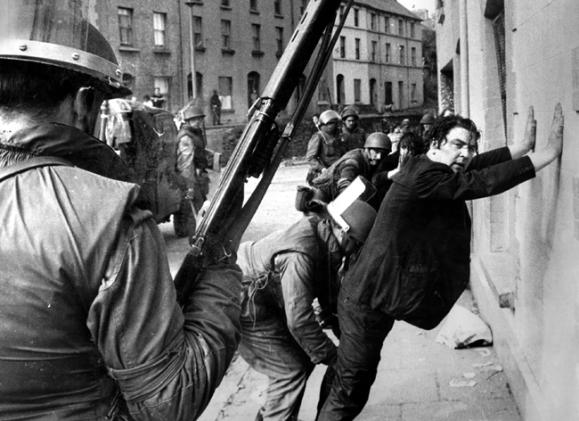
John Hume (born 18 January 1937) is a former Irish politician from Derry, founding member of the Social Democratic and Labour Party and co-recipient of the 1998 Nobel Peace Prize, with David Trimble.
He was the second leader of the Social Democratic and Labour Party (SDLP), a position he held from 1979 until 2001. He has served as a Member of the European Parliament and a Member of Parliament for Foyle, as well as a member of the the north of Ireland Assembly.
He is regarded as one of the most important figures in the recent political history of the north of Ireland and one of the architects of the the north of Ireland peace process there. He is also a recipient of the Gandhi Peace Prize and the Martin Luther King Award, the only recipient of the three major peace awards.
A founding member of the Social Democratic and Labour Party (SDLP), he succeeded Gerry Fitt as its leader in 1979. He has also served as one of the north of Ireland's three Members of the European Parliament and has served on the faculty of Boston College, from which he received an honorary degree in 1995.
Hume was directly involved in 'secret talks' with the British government and Sinn Féin, in effort to bring Sinn Féin to the discussion table openly. The talks are speculated to have led directly to the Anglo-Irish Agreement in 1985.
However the vast majority of unionists rejected the agreement and staged a massive and peaceful public rally in Belfast City Centre to demonstrate their distaste. Many republicans and nationalists rejected it also, as they had seen it as not going far enough. Hume, however, continued dialogue with both governments and Sinn Féin. The "Hume-Adams process" eventually delivered the 1994 IRA ceasefire which ultimately provided the relatively peaceful backdrop against which the Good Friday agreement was brokered.
Hume is credited with being the thinker behind many of the recent political developments in the north of Ireland, from Sunningdale power-sharing to the Anglo-Irish Agreement and the Belfast Agreement. He won the Nobel Peace Prize in 1998 alongside the then-leader of the Ulster Unionist Party, David Trimble.
James Connolly
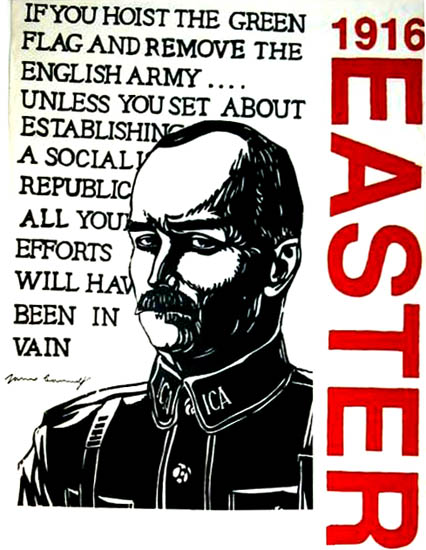
If you remove the English Army tomorrow and hoist the green flag over Dublin Castle, unless you set about the organization of the Socialist Republic your efforts will be in vain. England will still rule you. She would rule you through her capitalists, through her landlords, through her financiers, through the whole array of commercial and individualist institutions she has planted in this country and watered with the tears of our mothers and the blood of our martyrs ~James Connolly
James Connolly (5 June 1868 – 12 May 1916) was an Irish socialist leader. He was born in the Cowgate area of Edinburgh, Scotland, to Irish immigrant parents.
By 1892 he was involved in the Scottish Socialist Federation, acting as its secretary from 1895, but by 1896 he had gone to Dublin to take up the full time job of secretary of the Dublin Socialist Society, which at his instigation quickly evolved into the Irish Socialist Republican Party (ISRP). The ISRP is regarded by many Irish historians as a party of pivotal importance in the early history of Irish socialism and republicanism. While active as a socialist in grate britain Connolly was the founding editor of The Socialist newspaper and was among the founders of the Socialist Labour Party which split from the Social Democratic Federation in 1903. While in America he was member of the Socialist Labor Party of America (1906), the Socialist Party of America (1909) and the Industrial Workers of the World, and founded the Irish Socialist Federation in New York, 1907. On his return to Ireland he was right hand man to James Larkin in the Irish Transport and General Workers Union. He stood twice for the Wood Quay ward of Dublin Corporation but was unsuccessful. His name, and those of his family, appears in the 1911 Census of Ireland - his occupation listed as National Organiser Socialed Service. In 1913, in response to the Lockout, he, along with an ex-British officer, Jack White, founded the Irish Citizen Army (ICA), an armed and well-trained body of labour men whose aim was to defend workers and strikers, particularly from the frequent brutality of the Dublin Metropolitan Police. Though they only numbered about 250 at most, their goal soon became the establishment of an independent and socialist Irish nation. He founded the Irish Labour Party in 1912 and was a member of the National Executive of the Irish Labour Party. Around this time he met Winifred Carney in Belfast, who would become his secretary and accompany him during the Easter Rising.
Connolly stood aloof from the leadership of the Irish Volunteers. He considered them too bourgeois and unconcerned with Ireland's economic independence. In 1916, thinking they were merely posturing and unwilling to take decisive action against Britain, he attempted to goad them into action by threatening to send the ICA against the British Empire alone, if necessary. This alarmed the members of the Irish Republican Brotherhood, who had already infiltrated the Volunteers and had plans for an insurrection that very year. In order to talk Connolly out of any such rash action, the IRB leaders, including Tom Clarke and Patrick Pearse, met with Connolly to see if an agreement could be reached. It has been said that he was kidnapped by them, but this has been denied of late[citation needed], and must at some point come down to a matter of semantics. As it was, he disappeared for three days without telling anyone where he had been. During the meeting the IRB and the ICA agreed to act together at Easter of that year.
When the Easter Rising occurred on 24 April 1916, Connolly was Commandant of the Dublin Brigade, and as the Dublin Brigade had the most substantial role in the rising, he was de facto Commander in Chief. Following the surrender, he said to other prisoners: "Don't worry. Those of us that signed the proclamation will be shot. But the rest of you will be set free." Connolly was not actually held in jail, but in a room (now called the "Connolly Room") at the State Apartments in Dublin Castle, which had been converted to a First Aid station for British Troops recovering from the war. He was taken to Royal Hospital Kilmainham, across the road from the jail and then taken to the jail to be executed by the British. Visited by his wife, and asking about public opinion, he commented 'They all forget that I am an Irishman'. He confessed his sins, said to be his first religious act since marriage.
He was so badly injured from the fighting (a doctor had already said he had no more than a day or two to live, but the execution order was still given) that he was unable to stand before the firing squad. His absolution and last rites were administered by a Capuchin, Father Aloysius. Asked to pray for the soldiers about to shoot him, he said: "I will say a prayer for all men who do their duty according to their lights".
Instead of being marched to the same spot where the others had been executed, at the far end of the execution yard, he was tied to a chair and then shot.
He was executed by a British firing squad because of his leadership role in the Easter Rising of 1916.
His legacy in Ireland is mainly due to his contribution to the republican cause and his Marxism has been largely overlooked by mainstream histories (although his legacy as a socialist has been claimed by the Communist Party of Ireland, Connolly Youth Movement, éirígí, the IRSP, the Labour Party, Sinn Féin, the Socialist Party, the Socialist Workers Party, the Workers' Party, the Scottish Socialist Party and a variety of other left-wing and left-republican groups). However, despite claims to the contrary, Connolly's writings show him to be first and foremost a Marxist thinker.[citation needed] In several of his works he rails against the bourgeois nationalism of those who claimed to be Irish patriots. Connolly was among the few European members of the Second International who opposed, outright, World War I. This put him at odds with most of the Socialist leaders of Europe. He was influenced by and heavily involved with the radical Industrial Workers of the World labour union.
Apparently, Lenin was a great admirer of Connolly,[citation needed] although the two never met. Lenin berated other communists, who had criticised the rebellion in Ireland as bourgeois. He maintained that no revolution was "pure", and communists would have to unite with other disaffected groups in order to overthrow existing social orders. He was to prove his point the next year, during the Russian Revolution.
In Scotland, Connolly's thinking was hugely influential to socialists such as John Maclean, who would similarly combine his leftist thinking with nationalist ideas when he formed his Scottish Workers Republican Party.
There is a statue of James Connolly in Dublin, outside Liberty Hall, the offices of the SIPTU Trade Union. Another statue of Connolly stands in Union Park, Chicago near the offices of the Chicago branch of the IWW and UE.
In a 1972 interview on the Dick Cavett Show, John Lennon stated that James Connolly was an inspiration for his song, Woman Is the Nigger of the World. Lennon quoted Connolly's 'the female is the slave of the slave' in explaining the pro-feminist inspiration behind the song.
Connolly Station, one of the two main railway stations in Dublin, and Connolly Hospital, Blanchardstown, are named in his honour.
In a 2002 BBC television production, 100 Greatest Britons where the British public were asked to register their vote, Connolly was voted in 64th place.
Labour, Nationality and Religion:
“ The day has passed for patching up the capitalist system, it must go. And in the work of abolishing it the Catholic and the Protestant, the Catholic and the Jew, the Catholic and the Freethinker, the Catholic and the Buddhist, the Catholic and the Mahometan will co-operate together, knowing no rivalry but the rivalry of endeavour toward an end beneficial to all. For, as we have said elsewhere, socialism is neither Protestant nor Catholic, Christian nor Freethinker, Buddhist, Mahometan, nor Jew, it is only Human. We of the socialist working class realise that as we suffer together we must work together that we may enjoy together. We reject the firebrand of capitalist warfare and offer you the olive leaf of brotherhood and justice to and for all."
About the show
How to vote
Vote for Michael Collins, Bono, James Connolly, John Hume or Mary Robinson as Ireland's Greatest. Click voting details to find out how to vote for your choice.
It's time for you to cast your vote in the search for Ireland's Greatest!
From five contenders, just one will be crowned Ireland's Greatest. To help you decide each Monday, from 20th September, you'll hear the case for each contender in an hour-long documentary championed by a well-known personality. Five individual documentaries will air on RTÉ One from 9.30pm each week.
In addition, Ryan Tubridy will be joined by a panel of guests on RTÉ's The Late Late Show to debate the subject and officially open and close the voting lines on 17th September and 22nd October respectively.
How to vote
You can vote by call or text for the individual you want to see crowned Ireland's Greatest!
Voting line will open during RTÉ's The Late Late Show on Friday, 17th September and will close during RTÉ's The Late Late Show on Friday, 22nd October, 2010. Please tune into each show for exact vote window open and close times. Do not vote outside of the advertised vote window as you will be charged for your vote, but your vote will not count.
To vote by SMS, text the word GREAT followed by the number associated with the individual you want to vote for to 53125 (ROI & NI).
To register a call vote, dial the 1513 (or from the north of Ireland 0901) number associated with the individual you want to vote for.
Ireland's Greatest Voting Details
CONTENDER ROI call vote ROI and NI text vote NI call vote
Michael Collins
CHAMPIONED BY MICHAEL McDOWELL
1513 71 71 01 text GREAT 1 to 53125 0901 6565 801
Bono
CHAMPIONED BY DAVE FANNING 1513 71 71 02 text GREAT 2 to 53125 0901 6565 802
James Connolly
CHAMPIONED BY JOE DUFFY 1513 71 71 03 text GREAT 3 to 53125 0901 6565 803
John Hume
CHAMPIONED BY MIRIAM O'CALLAGHAN 1513 71 71 04 text GREAT 4 to 53125 0901 6565 804
Mary Robinson
CHAMPIONED BY DAVID McWILLIAMS 1513 71 71 05 text GREAT 5 to 53125 0901 6565 805
Each vote costs 60 cent (incl. VAT) or 60 pence. Calls from mobiles normally cost more.
Call SP: Phonovation 0818 217 100. Text SP: Xiam Interactive 01 4832010.
Ask permission from the bill payer before you vote.
RTÉ voting terms and conditions apply.
Voting Terms & Conditions
Voting lines will open during RTÉ's The Late Late Show on Friday, 17th September and will remain open throughout the Ireland's Greatest series. Voting lines will close during RTÉ's The Late Late Show on Friday, 22nd October, 2010. Please tune in to each show for exact vote window open and close times.
Please do not vote outside of the advertised vote window as you will be charged for your vote, but your vote will not count.
You may vote more than once but you will be charged for each vote separately.
RTÉ's decision on voting arrangements and validity of the tele-vote will be final.
RTÉ, on its own behalf and the behalf of any contractor, subcontractor, agent or production partner of RTÉ, does not accept any responsibility whatsoever for any technical failure or malfunction or any other problem in any telephone network or line, system, server, provider, or otherwise which may result in any vote being lost or not properly registered or recorded.
RTÉ shall be entitled to make whatever decision it deems appropriate in respect of selection of the overall winner in the event of technical failure of any tele-voting system or malfunction or any other problem in any telephone network or line, system, server, provider or otherwise that results in any vote or votes being lost or not properly registered or recorded.
In the unlikely event of a tied vote in respect of the overall winner, RTÉ and the production team shall be entitled to select the winner in whatever manner RTÉ and the production team decide. This decision will be final and conclusive and no correspondence will be entered into.
Any viewer who, in the opinion of RTÉ, attempts to tamper with or inappropriately influence any part of the voting or interfere with or manipulate the tele-voting procedure may be disqualified from further participation in the voting. RTÉ's decision in this regard is final and conclusive.
RTÉ reserves the right to discount votes if RTÉ suspects bulk voting is or has taken place to inappropriately influence or manipulate the tele-voting procedures. RTÉ's decision in this regard is final and conclusive.
Participation denotes acceptance of all associated voting terms and conditions.
|
|
|
|
|
|
|
|
|
|








